#excellently captured homoeroticism
Explore tagged Tumblr posts
Text
The Interview With the Vampire TV show is a perfect example of how adaptations do not have to follow the source material closely to be an excellent adaptation.
(This is a spoiler-free commentary, but it does discuss the dynamics of the characters in general.)
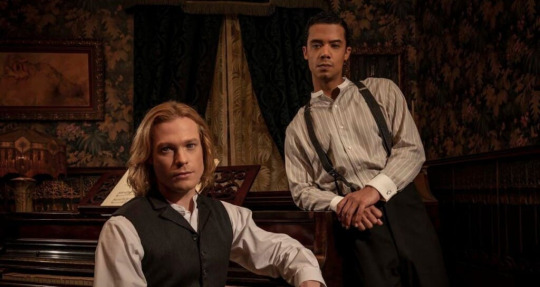
I read the books back in the day, and of course, saw the original movie. Despite a laundry list of big changes, the series still feels extremely true to the books because it captures the spirit. It gets the characters and their fucked-up dynamics right. It doesn't shy away from them being melodramatic monsters. It keeps to the rules established in the source material. The show also makes sure to preserve key moments and key scenes, but always with a twist.
Since they did that, they were free to shift things in time, amp up and adapt certain dynamics, and change the race of characters in a way that deepens the story and complicates already extremely complicated power dynamics.

The original movie stuck more closely to the era and the appearance of the characters as described by Anne Rice, but I don't think the story loses anything by changing those two elements. In fact, it gives it modern relevance and room for political and social commentary.
I have never ascribed to the idea that an adaptation has to be slavishly accurate to the source material to be a good adaptation. It just has to be smart enough to identify what to keep and what can change. An adaptation adapts. Honestly, I find it boring when I see exactly what was in a book up on screen with no surprises. Where's the fun in that?
The difference between a good adaptation and a bad one is not how accurate it is to the source material, but how well the adaptation respects what made the story compelling to begin with.
What's important here?
Lestat is dramatic and powerful and a monster who is deeply charismatic, but also manipulative.
Louis is overdramatic and self-hating, but oddly drawn to Lestat.
Claudia is fierce, but bitter about her eternal childhood.
Their relationship is deeply toxic but with true affection. They are monsters, but monsters capable of intense love and devotion - to the point where it has the power to destroy them.
THAT is at the core of this story. THAT is what they keep intact. This frees up all sorts of avenues for play around a few key plot beats.
This room for play also gives opportunities to expand on thinner characters or rewrite them entirely. It's been a long time since I read the books, but I don't recall Daniel standing out as more than a framing device, especially in earlier books. But in the show, he's one of the best parts. Not only does he take a much more active role in the story, he delivers some of the most hilarious and cutting lines of the entire series. If the show had stuck closely to the source material, we wouldn't have this Daniel.

It was also smart of them to make Claudia a few years older. The eternal child element is preserved, but the layer of arrested teenaged hormones and womanhood that will never blossom adds an extra layer of angst and sadness. She is stuck forever in a state of rebellion, never allowed to settle and come into her own.
Having her be a young Black woman also deepens her attachment to Louis, visually, socially and symbolically. They are different from Lestat and they understand each other in a way he never can. She's still very much the Claudia from the book but with layers added to deepen her character and add new, fresh dynamics and complications.
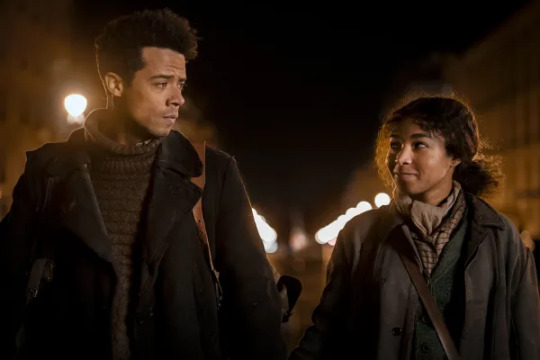
It's also delightful to see the show take the homoeroticism that was subtextual in the early books with Louis and Lestat (and in the original film) and making it unapologetically text. Anne Rice's Vampire Chronicles have always been incredibly queer and subversive, but it's amazing to see that side of it fully embraced and stated plainly with no ambiguity or qualifiers or hints. It's queer and that queerness is woven into the fabric of the entire narrative. Louis and Lestat are the toxic beating heart of the Vampire Chronicles.
It's also important because we need messy, dark, fucked-up queer narratives. Sweet, coming-of-age stories and romances are of course, important - especially for younger queer people. But us older queer folk not only want to see ourselves in multiple genres, we want permission to see imperfect, messy, and yes, even evil characters. It's a way of reclaiming the monstrous queer that was villainized for so long and making it our own. We want to find something beautiful in the dark.
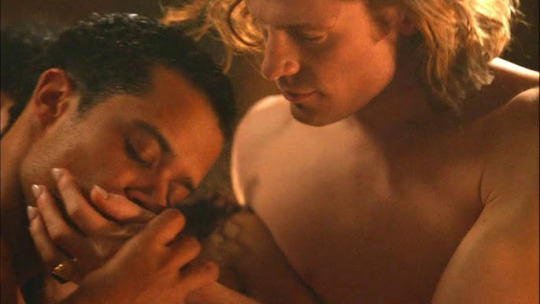
If we all thought about it, we could probably think of dozens of examples where a show or movie went far off-script from the source material and was still an excellent adaptation.
Interview With the Vampire is just the most recent and one of the best examples of a stellar adaptation that respects the source material but also builds and expands on it.
I look forward to seeing how they surprise me next season.
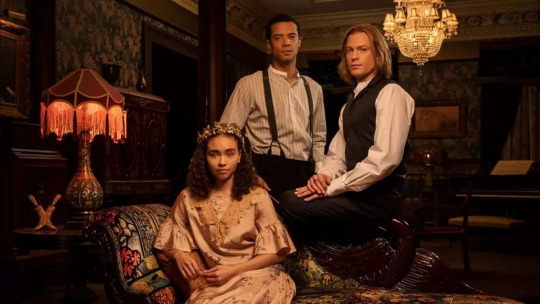
#interview with the vampire#amc iwtv#iwtv#amc interview with the vampire#loustat#fandom discussion#fandom commentary#queer characters#queer media#queerness#book adaptation#reviews#commentary#television commentary#tv commentary#tv series#lestat de lioncourt#claudia de lioncourt#claudia de pointe du lac#louis de pointe du lac#amc immortal universe
193 notes
·
View notes
Text
The Killa Choreography: Commentary and Analysis
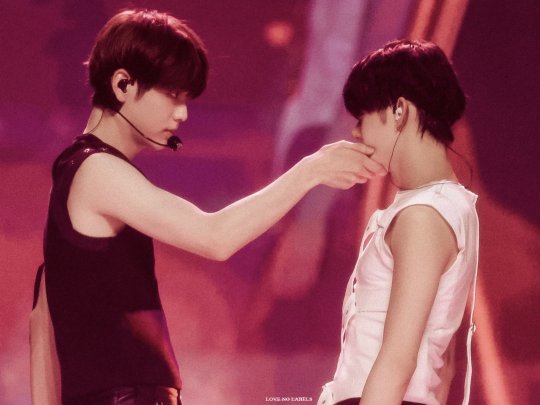
So, the day has arrived where we finally know what The Killa looks like on stage! It was Yeonjun and Soobin's first time performing this unit song, and we all knew it would be something sexy when it was released last month. If you don't know the song, well, you don't even need to take a glance at the lyrics to catch the vibe. But in case you're curious, there's lines like "tame me and fill me up with you" and "you're dominating me" so…you can imagine what sort of attention this track got and the anticipatory hype leading up to the concert. It seemed every fan had one question on their mind, namely What would this performance look like?
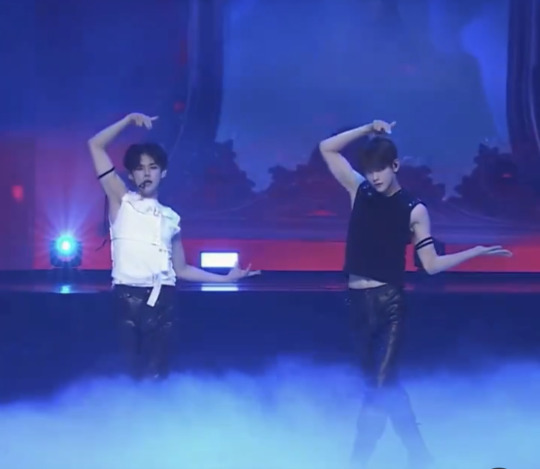
What I find interesting about this stage is that it easily could have been a track paired with sensual choreography for the audience - you know, your standard kpop fan service platter full of the Sexy Boyfriend fantasy where fans are meant to believe their idols are singing about wanting them. And yet it took a surprisingly creative direction by yes, clearly having a sensual dance with your typical kpop fan service elements, but (contrary to my expectations!) communicating first and foremost a sensual story through the choreography. Let's take a look.
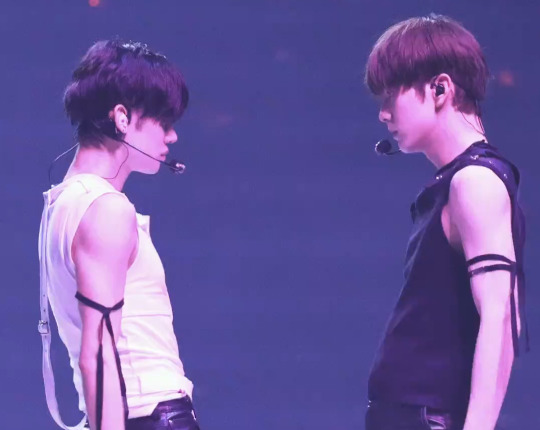
The choreo starts with Soobin and Yeonjun approaching each other from opposite ends of the stage, wearing opposite colored clothing (black and white). More on that in a moment. First, I'd like to direct your attention to the screen behind them, which depicts large mirrors encasing their walk on the stage.
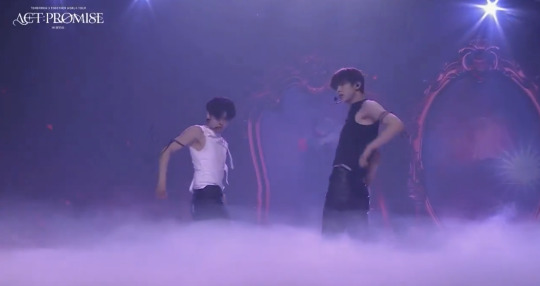
The utilization of mirrors as a visual design feature is really cool for a track containing this much lust because mirrors, while symbolically serving many purposes, tend to represent the duality of self: we check the mirror to assure that who we see in the reflection is an acceptable version of us who we can present to the world; that nothing noticeably flawed or unsatisfactory comes beneath the surface. As such, mirrors force us to acknowledge our duality and assuage our two opposing sides (light and dark). There's a quote I really love by Michelle Arch that captures this sentiment well: "Through mirrors we see our cognizant, social, 'better' self and the natural world in which we live, while also glimpsing, and sometimes succumbing to, the darker, depraved image of our subconscious 'second' self and the frightening, otherworldly realm in which it resides".
Given that this song relies heavily on communicating lust and our narrator's obsessive desire to be controlled - what one would consider the dark and depraved subconcious - the use of mirrors alongside the clothing color contrast was an excellent creative choice! While color theory suggests that white is a typical color for innocence, and black is characteristic for, well, all things dark and corrupt, I think this color choice was used more strongly to represent the opposite push and pull energy we're about to witness between them, as well as the aforementioned duality they exhibit.
Once they reach each other on stage, Soobin gently reaches out and rests his hand below Yeonjun's chin. Then, in sync with the beat, he gracefully glides his hand away while singing "Tame me, please", as Yeonjun's gaze follows his hand.

This moment intrigued me not just because it's that typical txt homoeroticism coming through lol but because it sets up a story. A fan on Twitter made an exciting point, namely that Yeonjun, by hypnotically following Soobin's hand, is the character in this performance who is initially being tamed. And so starts a cat and mouse chase of each character confessing their desire and tantalizingly pushing and pulling away from each other.
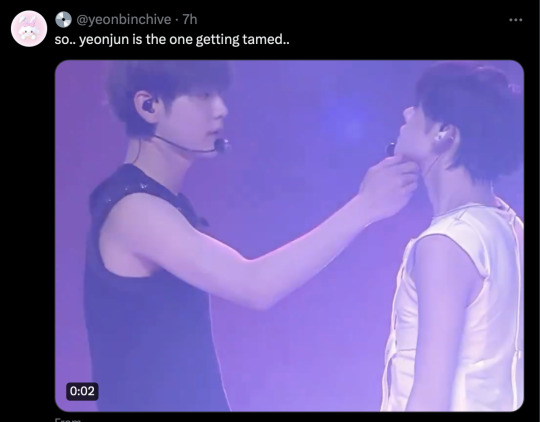
They break away from each other but Yeonjun keeps his eyes on Soobin as his body is sliding away. He sings: "I'm craving it more and more, you know I want you bad, show me mercy"
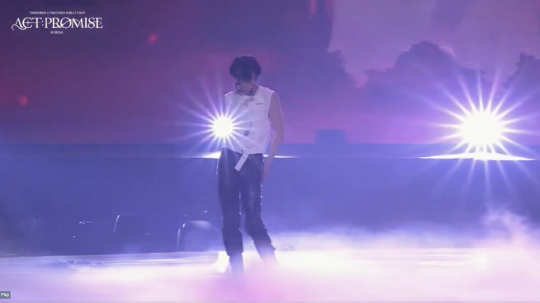
Right before we transition to Soobin's part, they point at each other and say "The moment that we found each other in our eyes".
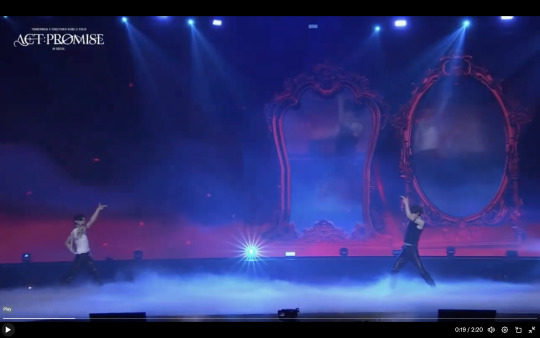
I thought the pointing at each other was significant because this easily could have been turned into a kpop fan service thing where they point at the audience while saying those lines, but instead this motion acknowledges that they're referring to each other, further emphasizing that this is a performance between two impassioned characters who are seeking each other. Soobin says right after this "Want you to tame me now [...] I'll serve you." It's clear now that this is a conversation.
They slowly move towards one another and I absoluteoy love the detail of Yeonjun grabbing the hem of his shirt as if he's being involuntarily pulled towards Soobin.
When they are within reach of each other, Yeonjun glides his hand across Soobin's chest and they both delve into the chorus choreography.
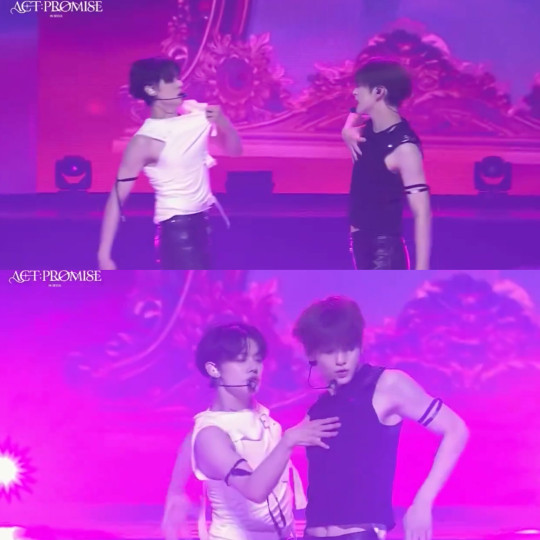
The chorus part feels more fan servicey to me because rather than facing each other, they are side by side hip thrusting while facing the audience. Perhaps it would've gotten a touch too erotic if they went there lol (after all wasn't the age requirement for his conert 9 and up or something??).
They transition out of the chorus by circling one another and sizing each other up.
Then they whip out the finger guns at each other once again while the lyrics center again on wanting to be dominated and it's "only you". If that weren't enough, they point at each other AGAIN repeatedly during the series of "you, you, you"s playing in the song.
I'm also a little in love with the detail of Soobin placing his hand on Yeonjun's shoulder as Yeonjun sings "Yes, I belong to you". I'm reaching my image limit so I'm just going to include a nice mirroring detail towards the end where Yeonjun rests his hand on Soobin's shoulder, an apparent callback to earlier. Perhaps a confirmation that these characters affirm they now belong to each other?
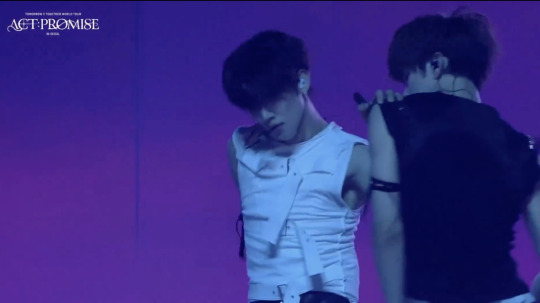
In conclusion, this performance surprised me more than I expected (and I know they'll get a bit more bold for this stage once they hit their US tour stops). I know that some could argue that placing two members into a sensual choreography with each other is a form of fan service and I agree to an extent, but I'd also counter by saying that that perspective disregards the creativity and craft put into the choreography. This isn't sexy for the sake of being sexy. It's sexy because it's intertwining the song's overt sensuality with characters embodying that lust.
Overall, I'd say the choreography has shifted my perspective of the song. I used to see it as one voice communicating wanting one abstract idea of a person but now I see Soobin and Yeonjun's verses as two separate conversations that their characters are having with each other. Everyone thank our little freak Taehyun for contributing to the songwriting on this. Gonna have to find out who to thank for the choregraphy. In the meantime, did you notice anything in the performance that I didn't touch on that you wated to discuss? How about screaming into the void with me? Thanks for reading and I'm looking forward to day 2 already!
#tomorrow x together#txt analysis#txt choreography#media analysis#yeonjun#soobin#the killa#txt act promise#moasource#txtnetwork
52 notes
·
View notes
Note
idk if you're still taking prompts but, TJ as a tattoo artist and Cyrus getting his first tattoo. i love your writing so much, my friend and i just spent an hour talking about how much we love 1986 and best laid plans kskskskss
This ask is literally like over a year old, I’m so sorry. Thank you for your kind words about my fic though!
The Sun Sets Of Itself
“I don’t know if this is a good idea,” Cyrus said, peering into the studio.
Behind him, Buffy and Andi shared an unimpressed look. They’d been through this entire song and dance at least three times since they got on the bus to get to the shop, and that had been after the several months of Cyrus going back and forth on whether it was a good idea or not.
“Dude, if you don’t want to do it you don’t have to,” Buffy sighed.
Cyrus worried at his lip for a moment, eyes flicking up to the intricately painted lettering.
‘DARKSIDE TATTOOS.’
The studio had a five-star rating on Google. Its reviews all said the shop was clean, the staff polite and the artwork itself was of excellent quality. Cyrus had spent weeks pouring over their Instagram, checking out the individual artists and stressing out about the exact wording of his booking email. It was perfect.
“But I do want to,” he said.
The girls groaned. Andi looked heavenward with an expression on her face that said Cyrus might die by her hand if he didn’t walk through that door in the next ten minutes.
“Look,” she said. “Like Buffy said, you don’t have to, but you know if you don’t you’ll end up regretting it. This was your idea dude.”
It was true. He had wanted it badly enough that he’d gone to his Rabbi to talk through it. The idea had been sitting in his head since he was thirteen; a rose for his Bubbe, just over his heart, with her favourite phrase written underneath in Hebrew.
“Okay,” he said, bracing himself with a deep breath. “Okay.”
A small bell tinkled overhead when he pushed the door open and within an instant, a blonde head popped up from behind the desk at the front. The girl raised an eyebrow at the three of them and zeroed in on Cyrus.
“Cyrus Goodman?” She asked.
He nodded mutely.
“Awesome! Okay, I just need you to sign these forms for me before you can get started. Do you have your I.D on you?”
He pulled his driver’s license out from his pocket and handed it over, taking the clipboard of papers from her as she checked it over. After seeming to decide that he was not, in fact, lying about his age, she turned and bellowed towards the back of the studio.
“TJ! YOUR TEN THIRTY’S HERE!” She then turned back to him, smiling sweetly. “You can take a seat over there. He’ll just be a minute.”
Cyrus spent the next ten minutes sitting with Buffy and Andi on a small rustic bench, bouncing his leg restlessly and taking in the artwork that filled the walls. It was obvious that each wall was dedicated to a different artist, the styles all unique and eye-catching in their own way. There was a small collection of framed watercolour pieces above Andi’s head that had captured her interest and, across from them, several traditional pin-up pieces were displayed. The longer they sat the more tattoos Cyrus wanted, but the more terrified he got at the same time.
“What if this is a mistake?” He whispered to Buffy. His attempts at subtlety were lost, though. From where she was filing her nails at her desk, the blonde girl looked up and smirked. She was quite scary, actually.
“You’re overthinking it again,” Buffy hissed back.
He sighed. She was right. What he needed was a distraction. Maybe he should’ve brought his knitting with him. He still had a sleeve to go on the sweater he was making for Bex, after all.
Just as he was pondering how well knitting might have distracted him from the thought of permanently etching a piece of art onto his chest, a rather different distraction showed up.
“Cyrus Goodman?” Came a voice.
When he looked up, his jaw dropped. Standing there waiting was the prettiest guy Cyrus had ever seen. He looked like he’d walked straight off the cover of an alt-rock magazine. Tattoos covered his arms and neck and his hair was carefully shaved into a sharp undercut. He even had the gauges in his ears that Jonah was always saying he wished his mom would let him get. Beneath the fluorescent lighting, his green eyes seemed to glitter. Cyrus was aghast.
“Catching flies there, Cy,” Andi murmured, and he snapped his mouth shut.
“I’m TJ,” Tall, Punk and Gorgeous said, offering Cyrus a hand. “You ready to go?”
*
When Cyrus had finally gotten himself together enough to greet TJ properly, he’d followed him to his section in the back.
“Are your friends coming?” TJ asked.
Buffy had interjected quickly enough with her, “It’s cool, we’ll wait here.” And Cyrus wasn’t sure if he was grateful or not. On the one hand, he didn’t need to embarrass himself in front of all three of them, but on the other… he kind of wanted someone there to tell him to stop being a weenie when the needle started up.
TJ smiled at him all the way through agreeing on the design he’d drawn up, Cyrus taking off his shirt and getting the near purple outline copied onto his chest. Cyrus thought he might vibrate out of his own skin.
“I’m glad you messaged me for this,” TJ said as he prepared the ink.
“Oh?”
“Yeah, I really like doing flowers, especially when customers let me do the whole design. They always turn out exactly how I pictured them.”
Cyrus laughed nervously. “That’s good. I really like what you came up with - the gold detail on the petals was a nice touch.”
TJ grinned as he pulled out the gun.
“You ready?”
No.
“Sure,” Cyrus squeaked.
“Tell me if you want a break.”
The pain wasn’t as bad as he thought it would be. After a moment he even found himself relaxing. For some reason, he’d assumed that it would be a silent encounter, but TJ chattered on as he worked. He asked about Cyrus’ degree, getting excited when he mentioned film and going on a tangent about Fight Club. For a brief moment, Cyrus was worried he was about to reveal himself to be one of those men who called other people ‘snowflakes’ unironically, then found himself surprised and delighted when TJ started talking about the inherent homoeroticism of Tyler Durden’s character. After a while, Cyrus found himself chatting back just as happily. He hadn’t expected the two of them to have so much to talk about.
“So, what does it mean?” Asked TJ, after finishing up a long-winded rant about the coffee he’d spilt all over Amber - his sister and the girl at the front desk apparently - earlier that week on one particularly bad morning.
“Huh?”
“'The sun sets on its own.’ Is that right? I ran the words through a translator, but the internet screws it up sometimes.”
Cyrus smiled, trying to glance down at the tattoo without moving too much. TJ had just started on the words.
“Almost,” he said. “It’s ‘the sun sets of itself’. It’s an old proverb from the Talmud. My Bubbe used to say it to it me a lot when I was worried about something. I think she meant it kind of like 'life goes on’, but I don’t know if that’s actually what it means though.”
TJ nodded, smiling back. “That’s pretty cool. Is that why you’re getting this, then? For your Bubbe?”
“Yeah, she died a few years ago but I figured it would be a nice way to honour her. She was really into art.”
“Sounds like a cool lady.”
“She was.”
When they finished up, Cyrus was surprised to find disappointment settling in. Not with the artwork, which looked just as wonderful as he had hoped, but with the fact he had to leave. TJ’s smile and warm manner seemed to be strangely addictive. He wanted to know everything about him.
“Think you’ll be coming back anytime soon?” TJ asked, leaning against the desk as Cyrus handed a wad of bills over to Amber.
“Definitely.”
“Thank God,” TJ said, looking genuinely relieved. “I was worried this would be my only chance to ask you out.”
Cyrus left the studio bright red, grinning and with TJ’s cell number programmed into his phone. Buffy and Andi could tease all they wanted, but getting a tattoo had definitely been a good idea.
65 notes
·
View notes
Note
that quote about Emma is taken out of context though Autumn de Wilde was just talking about Knightly there that post is such a bait
as much as i appreciate your sharing this information with me, i can't honestly say that it changes my feelings. if the post had no caption at all, i would be just as inclined to see it (and the film in general) as homoerotic as i ever have.
my "everyone say thank you autumn de wilde" tag (which i assume is why you're telling me specifically?) was less from any impression of #representation than my general opinion that it's an excellent adaptation—an opinion that is far from hurt by the homoeroticism that i maintain is prominent, but comes primarily from my feelings that the tone of the novel was captured charmingly and the medium of film used effectively.
1 note
·
View note
Text
Joel Schumacher, Director of Batman Films and ‘Lost Boys,’ Dies at 80

Joel Schumacher, costume designer-turned-director of films including “St. Elmo’s Fire,” “The Lost Boys” and “Falling Down,” as well as two “Batman” films, died in New York City on Monday morning after a year-long battle with cancer. He was 80. Schumacher brought his fashion background to directing a run of stylish films throughout the 1980s and 1990s that were not always critically acclaimed, but continue to be well-loved by audiences for capturing the feel of the era. Schumacher was handed the reins of the “Batman” franchise when Tim Burton exited Warner Bros.’ Caped Crusader series after two enormously successful films. The first movie by Schumacher, “Batman Forever,” starring Val Kilmer, Tommy Lee Jones, Jim Carrey and Nicole Kidman, grossed more than $300 million worldwide. Schumacher’s second and last film in the franchise was 1997’s “Batman and Robin,” with George Clooney as Batman and Arnold Schwarzenegger as villain Mr. Freeze. For “Batman Forever,” the openly gay Schumacher introduced nipples to the costumes worn by Batman and Robin, leaning into the longstanding latent homoeroticism between the two characters. (In 2006, Clooney told Barbara Walters that he had played Batman as gay.) Several years after the Batman debacle, Schumacher directed the feature adaptation of Andrew Lloyd Webber’s musical “The Phantom of the Opera.” Despite tepid reviews, it received three Oscar noms. In 1985 Schumacher struck gold with his third feature film, “St. Elmo’s Fire,” which he directed and co-wrote. Brat Packers including Rob Lowe, Emilio Estevez and Ally Sheedy as well as a young Demi Moore starred in the story of a bunch of Georgetown grads making their way through life and love. Even the theme song was a hit and is still played to evoke the era. The film offered a pretty smart take on the complexities of post-college life. His next film was a big hit as well: horror comedy “The Lost Boys,” about a group of young vampires who dominate a small California town, starred Jason Patric, Kiefer Sutherland, Corey Feldman and Corey Haim. It became a cult favorite, and a TV series adaptation has long been in the works. Schumacher had a high-concept screenplay by Peter Filardi and an A-list cast — Julia Roberts, Kiefer Sutherland, Kevin Bacon, William Baldwin — for the 1990 horror thriller “Flatliners,” about arrogant medical students experimenting with life and death, and the director hit it fairly big again, with a domestic cume of $61 million. While those hits captured the era well, others during that period were misfires, such as the 1989 remake of the French hit “Cousin/Cousine” called “Cousins” and starring Ted Danson and Isabella Rossellini and the sentimental “Dying Young,” starring Roberts and Campbell Scott. But in 1993 he showed what he was capable of with the critically hailed “Falling Down,” starring Michael Douglas as a defense worker who’s lost it all and decides to take it out on whomever he comes across. The film played in competition at the Cannes Film Festival. The New York Times said the film “exemplifies a quintessentially American kind of pop movie making that, with skill and wit, sends up stereotypical attitudes while also exploiting them with insidious effect. ‘Falling Down’ is glitzy, casually cruel, hip and grim. It’s sometimes very funny, and often nasty in the way it manipulates one’s darkest feelings.” Schumacher’s next film was also a solid hit. “The Client,” based on a John Grisham novel, was a highly effective legal thriller that also boasted terrific rapport between Susan Sarandon’s lawyer and her 11-year-old client, a boy played by Brad Renfro who has witnessed a murder. Between the two “Batman” films, Schumacher directed another Grisham adaptation, “A Time to Kill,” which sported a terrific cast (including Samuel L. Jackson, Kevin Spacey, Sandra Bullock, Ashley Judd and a career jump-starting turn by a young Matthew McConaughey) and, while not without its own weaknesses, asked important questions about race. After the second “Batman” he made the much darker, smaller-scale thriller “8MM,” which followed a miscast Nicolas Cage as a family-man private detective in pursuit of those who made what appears to be a snuff film. His next film, 1999’s “Flawless,” about a homophobic cop who’s suffered a stroke, played by Robert De Niro, and a drag-wearing Philip Seymour Hoffman, was formulaic — the odd couple who couldn’t be more different find out they have a lot in common — but it sported excellent performances by the leads and certainly had heart. Switching gears dramatically, Schumacher made “Tigerland,” starring a young Colin Farrell in the story of young recruits preparing to go off to Vietnam. It had a gritty look, but while some critics saw an earnest quality, others saw cynicism. Schumacher’s 2002 thriller “Phone Booth,” which reunited the director with Colin Farrell and Kiefer Sutherland — and intriguingly trapped Farrell’s antihero in the title New York City phone booth for almost all of the film’s running time — had critics and audiences alike talking, even if the ending was a cop-out. His other films included actioner “Bad Company,” starring Anthony Hopkins and Chris Rock; “Veronica Guerin,” starring Cate Blanchett as a journalist crusading rather recklessly against the Irish drug trade; and Jim Carrey thriller “The Number 23” and “Trespass,” starring Nicolas Cage and Nicole Kidman. Schumacher started out in showbiz as a costume designer, earning credits on 1972’s “Play It as It Lays,” Herbert Ross’ “The Last of Sheila” (1973), Paul Mazursky’s “Blume in Love (1973), Woody Allen’s “Sleeper” (1973) and “Interiors” (1978) and 1975 Neil Simon adaptation “The Prisoner of Second Avenue.” He was also credited as the production designer on the 1974 TV horror film “Killer Bees.” He also started to write screenplays, including 1976’s “Sparkle,” 1978 hit “Car Wash” and the adaptation for 1978 musical “The Wiz.” Schumacher’s first directing assignments came in television: the 1974 telepic “Virginia Hill,” which he also co-wrote and starred Dyan Cannon, and the 1979 telepic “Amateur Night at the Dixie Bar and Grill,” which he also penned. He stepped into the feature arena with the 1981 sci-fi comedy “The Incredible Shrinking Woman,” starring Lily Tomlin, followed in 1983 by “D.C. Cab,” an action-comedy vehicle for Mr. T that Schumacher also wrote. Born in New York City, he studied at Parsons the New School for Design and the Fashion Institute of Technology in New York. He worked in the fashion industry, but decided to instead pursue a career in filmmaking. After moving to Los Angeles, he applied his fashion background to working first as a costume designer and worked in TV while earning an MFA from UCLA. Schumacher directed a couple of episodes of “House of Cards” in 2013, and in 2015 he exec produced the series “Do Not Disturb: Hotel Horrors.” Camerimage, the International Film Festival of the Art of Cinematography, awarded Schumacher a special award in 2010. He also received the Distinguished Collaborator Award at the Costume Designers Guild Awards in 2011. Click here to view original web page at variety.com Read the full article
1 note
·
View note
Text
Day 1: Words of Validation
screw it I’m gonna post my favorite comments from AO3 anyway
“So hot i may cry okay sthap writing smut so wonderfully its not okay (its v okay dont ever stop)” [x]
“What just happened. Childhood officially spoiled, but that's very okay because, /woah/.” [x]
“I have no shame any more. I'd watch this.” [x]
“You inspired me to keep writing more." [x]
“This is just the kind of suppressed homoeroticism I love.” [x]
“I know this fic was posted a forever ago, but I loved it so much, I couldn't resist commenting. This is absolutely beautifully written. Those words just can't really describe how much I loved reading this. I am love with this entirely. <3″ [x]
“Um, excuse me, who gave you the right to make me feel emotions?” [x]
“hello yes I cried while I was reading this 10/10″ [x]
“I definitely prefer this over canon” [x]
“Beautifully written. You handle an array of racey topics very well, and I'm a huge fan of hurt/comfort stories. This read as a well thought out and executed storyline! Your work is very easy and enjoyable to read!” [x]
“Never thought I would read fic for this ship but I love it?????? This story is so beautiful and soft and these two boys are so cute!!! Great work!!!” [x]
“I know I've read this already on tumblr, but I can't remember whether I left a comment. And this deserves a comment.Wow, this was beautiful. Tragic and poetic, and slightly unreal (if that even makes sense) but somehow fitting perfectly into the universe of the show. The voices are spot on, but you still manage to maintain the supernatural atmosphere. It's just incredibly gorgeous and should have way more kudos and comments than it does. It's Romantic in the literary sense, if you know what I mean.” [x]
“Your writing. Your writing. I don't know if I want to cry or laugh because I love it so much. I have never once even thought of this pairing let alone shipped it, yet this is now one of my favorite fics just because you wrote it so well.” [x]
“My friends yell at me for shipping this and yet here I am again.” [x]
“How do you constantly make sex so endearing and adorable? This was heartwarming--you could honestly feel the love between these two. Just amazing, like all your work.” [x]
“I hate mpreg. Or I thought I did till I read this. You are amazi g” [x]
“You are a god. I've been reading your entire series here and I've loved every. Single. One. A lot. You just do such a fantastic job. This story is no exception. You always give me exactly what I was looking for and half the time I didn't know I wanted it. Plus your writing is great. It has such a warm, enticing voice. I'm just fangirling about it all. Thank you!!” [x]
“I liked this quite a lot, especially your writing style was very beautiful in my opinion. Somehow a bit melancholic, which I wasn't expecting but nevertheless found lovely. Thoughtful, deliberate wording, poetic sentences, not too fast pacing. It'd be easy to take the comic route with sex pollen, but that isn't the case here. Sure, there's humour and warmth, it's not like this is a tragedy or even remotely sad, but still the story wasn't comedy either. That, I think, is mainly thanks to your writing style. Lovely, beautiful story.” [x]
“You know those fics where you hang onto every little word and detail? This is one of them.” [x]
“hhhhhhng. I think you broke me.” [x]
“YOU thanks this is my worst kind of favorite story my heart is gonna hurt for like six years thanks bye world lmaoThat was awesomely written and also how dare you you monster my heart is shriveling and I'm sad but like well done my dude at least I'll die knowing skysolo is my killerI'm so conflicted bc I kind of want to strangle you but also I want to be sure you know that I mean it in a complementary way. The tragic love hate relationship that fandom has with paingst writers, oh my!D'x I'm gonna go read fluff or die, nice job man” [x]
“wow.. this was.. very different than i expected.. but it was good.. a really unique concept.. ive never read a fic like this before” [x]
“Okay, this is how the Maze Runner should've originally been written. You are the author now. Fuck James Dashner lol thank you for writing this! This is amazing! Your storyline makes much more sense! Excellent job(:” [x]
“So typically I don't like short fanfics. But this is just so amazing. You have managed to capture so much in so little words. It is impressive how good this is, but so short. Absolutely adore it. Amazing job.” [x]
“I don't know why but somehow, my chest twisted and constricted within me as I read this. It felt like I couldn't breathe but I WAS breathing, it was just kind of... difficult to, I guess. What I'm trying to say is that this whole thing, every word, is so beautifully sad that by my eyes alone I felt physically affected.You're amazing” [x]
“I just read the shit out of this entire series. Like maddening, addicted, speed-reading until the midnight hours by iphone light.Words cannot express how dope this whole collection of words was. So intricate and intriguing and well-written. I literally had to force myself to stop and sleep, eat, be a responsible adult.” [x]
“this fic singlehandedly cleared my skin, saved the bees, stopped global warming, and elected bernie sanders president” [x]
“This was short and sweet and to the point, but goddamn, it was perfect. I am really the kind of person who ships everything and this is one of my not-so-guilty pleasures.You've got a fluid and catchy style and I won't lie, that packed a hell of a punch for under 1,000 words.Really nice!“ [x]
“i rarely blush when I read smut these days but this had something and wow just wow xx” [x]
“your creativity just astonishes me, i can see the character in technicolor and you are writing in black and white” [x]
“I don't know who told you not to write this but I want them to tell you not to write many things. Because your spite-porn is super hot.” [x]
“honestly this is the most in character fic i've ever read? it's amazing i lovE IT!!!” [x]
“Everytime I reach the end of this marvelous fic I have to re-read it because it's so good and i want more but there isn't more so i go back to the start and it keeps getting better and do you know what this does to me? I am stuck in this infinite loop and i blame you” [x]
“ EVERYTHING YOU WRITE IS PERFECT AND MAGICAL AND GOOD. KTHNXBYE.” [x]
@ficwritersweek
5 notes
·
View notes
Text
New Post has been published on Cinephiled
New Post has been published on http://www.cinephiled.com/interview-director-alejandro-landes-colombias-powerful-oscar-submission-monos/
Interview: Director Alejandro Landes on Colombia’s Powerful Oscar Submission ‘Monos’
Writer/Director Alejandro Landes’ awe-inspiring third feature is a breathtaking survivalist saga set on a remote mountain in Latin America. The film tracks a young group of soldiers and rebels bearing names like Rambo, Smurf, Bigfoot, Wolf, and Boom-Boom who keep watch over an American hostage, Doctora (Julianne Nicholson) The teenage commandos perform military training exercises by day and indulge in youthful hedonism by night, an unconventional family bound together under a shadowy force known only as the Organization. After an ambush drives the squadron into the jungle, both the mission and the intricate bonds between the group begin to disintegrate. Order descends into chaos and within Monosthe strong begin to prey on the weak in this vivid, cautionary feverdream.
With a rapturous score by Mica Levi (Under the Skin, Jackie), director Alejandro Landes examines the chaos and absurdity of war from the unique perspective of adolescence, recalling Lord of the Flies and Beau Travail in a way that feels wholly original. Landes brings together a diverse young cast of both seasoned professionals (including Hannah Montana’s Moisés Arias) and untrained newcomers and thrusts them into an unforgiving, irrational, and often surreal environment where anything can happen — even peace.
I sat down with Alejandro Landes to discuss this remarkable film, winner of a Special Jury Award at the Sundance Film Festival and recently chosen by Colombia to represent the country in the Best Foreign Language Film at the upcoming Oscars.
Danny Miller: This film is a fucking masterpiece. There’s my blurb: “It’s a fucking masterpiece.”
Alejandro Landes
Alejandro Landes: (Laughs.) Well, that’s a great blurb, I’ll take it! We can throw in a few asterisks on the poster: “It’s a f**king masterpiece!
It’s pure poetry. I love the jaw-dropping beauty mixed with utter horror. I felt fully engaged with all the characters after about 10 minutes. How did you put together such a remarkable ensemble?
We looked at a bunch of kids from different places all over Colombia including urban skating culture and deep in the countryside. Out of the 800 kids we looked at, we chose about 25 and took them to live in a sort of mock basic training camp. In the morning, they did acting and improv exercises, and then in the afternoon they did physical training to learn how to carry a weapon, stand in formation, those types of things. By watching those 25 kids interact, I saw the dynamics that you would see like in a schoolyard — who flirts with who, who fights with who, and so on. I chose the final eight from there because the idea wasn’t just how each of them individually played their role, but what sparks would there be with them as an ensemble. That was key.
And some of them had never acted before?
Right. I mean, listen, there aren’t that many really good professional actors who are 13 or 14 anywhere, let alone in Colombia.
At least you didn’t have to weed out what American directors often call the “Disney kids.”
Oh, but I actually have a Disney kid (Moisés Arias, who starred with Miley Cyrus for four years in Hannah Montana) and he’s fantastic!
Oh, right, he’s excellent! How did he end up in the film?
I just thought it was very interesting because he comes from a Colombian family and had never made a movie there. When I met him, he was really psyched about doing the character even though his team in L.A. was not, they thought this film was just crazy. But he was very enthusiastic and did the basic training with the other kids and really took it to heart. He really bonded with them.
Is it ever tricky to mix professional actors with non-professionals?
I’ve heard from other directors that it’s very hard to mix the two. I can see that professional actors might be frustrated with the lack of discipline in non-actors, and the non-actors may feel intimidated by people with so much experience like Moisés and Julianne Nicholson. But luckily, our cast spent so much time together creating such strong bonds before we ever began shooting that it was never really an issue.
It probably helped that you were all together in such an isolated environment.
Yes, that’s true. But the non-actors were amazing. I’ve very proud of those moments like, for example, when Swede is able to completely hold her own with Julianne Nicholson’s Doctora in their intense scene together. I love how that scene shows the thin line between eroticism and death, between laughter and rage.
That scene was incredible. Did you end up making any script changes based on the group you ended up with?
That’s a great question. I actually did rewrite the screenplay after seeing them together. For example, when I wanted to have a romantic interest in the film, I wanted to make sure that it was between people who had real chemistry. My co-writer Alexis Dos Santos and I changed around several of the characters to make sure that we weren’t just forcing the page on the characters but letting the kids come through on the page as we got to know them better. We really needed to do that because there are so many characters, this wasn’t a typical narrative, it’s a very fluid point of view.
And speaking of fluidity, I have to admit that I had no idea when I first watched the film that Rambo was a girl! I knew there was some gender fluidity going on, but I was still very surprised afterwards.
I actually love that there are people who experienced the entire film thinking Rambo was a boy — even some of our distributors and marketing people at first. I never wanted to have one of those “big reveals” at the end, it’s not that kind of film. It’s almost like a post-gender situation. Does it change anyone’s deeper impressions of the film? I don’t think so.
I remember the scene when Rambo kisses Wolf and thinking that the homoeroticism of that scene was interesting but then it turns out that’s not the case and it’s more like these kids are free in many ways in that environment.
The bigger idea wasn’t just about gender, it was about denying the audience any type of binary conception of anything. Are you in the past or in the future? Are these people good or bad? Are they communists fighting for the left or are that extreme radicals fighting for the right? Is this character a boy or girl? Is this paradise or some kind of hell? The film doesn’t allow you to label them one thing or the other, including Julianne’s character who starts out very much like a victim but then feels like something very different at the end.
There were so many moments that didn’t go the way I thought they would. Was it always your intention to keep the identity and the political leanings of the Organization vague?
Yes. The thing is, I read so much about all of these different types of organizations and the bottom line is that they’re not so different from each other. I come from a country where you have paramilitary organizations, guerrilla organizations, narco organizations, you have foreign actors, you have state actors, and there are all these different fronts in these battles because it’s been going on for so long.
Plus, when you have kids engaged in such conflicts, is it ever really about ideology?
Absolutely, that’s a very good point. When you see these groups in Colombia that are working with children who were involved in such groups, you see some who fought for Communists and rebels and some who fought for ultra-right-wing groups and some who had fought for both. These kids were not exactly sitting in the trenches debating Karl Marx.
And who knows what they were escaping from in their own lives or if they were there totally against their will.
Right. Which is why I try to show something of the beginning at the end. Remember that 360-degree shot where we see the newly orphaned kids hiding under the table? That scene really hits me, it kind of says it all. What’s going to happen to these kids? Where are they going to go? Are they going to end up in this group? There are so many moments like that. I remember when Doctora is trying to get free by bonding with Swede. She asks here what she wants to do with her life, saying that she could help her, and Swede says, “I want to dance on TV.”
So poignant.
I wanted to come at Julianne’s character, Doctora, through the humanity of her situation. It didn’t matter to me what she was doing in Colombia when she was captured or what the ideology of the group who captured her is.
Did you find the reactions to the film were different in Colombia compared to what you’re seeing here?
The response has been fascinating because there are such delicate fibers when you have a civil war that’s been going on for more than 60 years.
Do the audiences there have more of a vested interest in knowing which side this group is on in the conflict?
It’s interesting because the critics wanted to know, but the audiences were fine with the ambiguity. For me this is not a film about child soldiers. I mean, I think everyone agrees that children should not be part of war, but I was interested in pushing that further. I wanted to examine that period between childhood and adulthood, that borderline that can often be very conflicted even if you’re just a normal kid on the first day of school who is undergoing all these changes. I think this film creates a kind of mirror between those two conflicts: the war that is present in the world and the interior wars these kids are going through. Who am I? Who do I want to be? Adolescence can be a very intense period that is full of trauma.
Definitely. And thank God most of us don’t have AK-47s in her our hands when we’re going through it! Apart from the horror that we see on screen, this is still one of the most visually beautifully films I’ve ever seen. The location is just jaw-droppingly gorgeous but I imagine that it must have been extremely difficult to shoot there.
Oh God, making this movie was a real beast. We were 14,000 feet up in the mountains where there is very little oxygen in the air and the weather can change on a dime so you can’t really follow a strict shooting plan. Just to get to that jungle canyon you need mules and kayaks. It was very tough. I would say that every person was at the limit of what they could do physically. Pretty much everyone had their day on a stretcher or in an ambulance. I had mine, but somehow we managed to keep it together.
You never had one of the kids come up to you and say, “I just can’t do this anymore?”
Never. But we all cried at some point during the filming.
Those emotions were probably beneficial for the scenes you were shooting!
Everyone was really giving it their all. They felt infused with confidence which was amazing to see. Sometimes the kids would come up to me and ask if they could do a scene over again, that they felt that they could do better, even when I liked the take. I don’t think I’ve ever seen a more devoted group of people making a film under such difficult conditions.
youtube
Monos opens on September 13, 2019, in select theaters.
0 notes
Text
Joel Schumacher, Director of Batman Films and ‘Lost Boys,’ Dies at 80
Joel Schumacher, costume designer-turned-director of films including “St. Elmo’s Fire,” “The Lost Boys” and “Falling Down,” as well as two “Batman” films, died in New York City on Monday morning after a year-long battle with cancer. He was 80. Schumacher brought his fashion background to directing a run of stylish films throughout the 1980s and 1990s that were not always critically acclaimed, but continue to be well-loved by audiences for capturing the feel of the era. Schumacher was handed the reins of the “Batman” franchise when Tim Burton exited Warner Bros.’ Caped Crusader series after two enormously successful films. The first movie by Schumacher, “Batman Forever,” starring Val Kilmer, Tommy Lee Jones, Jim Carrey and Nicole Kidman, grossed more than $300 million worldwide. Schumacher’s second and last film in the franchise was 1997’s “Batman and Robin,” with George Clooney as Batman and Arnold Schwarzenegger as villain Mr. Freeze. For “Batman Forever,” the openly gay Schumacher introduced nipples to the costumes worn by Batman and Robin, leaning into the longstanding latent homoeroticism between the two characters. (In 2006, Clooney told Barbara Walters that he had played Batman as gay.) Several years after the Batman debacle, Schumacher directed the feature adaptation of Andrew Lloyd Webber’s musical “The Phantom of the Opera.” Despite tepid reviews, it received three Oscar noms. In 1985 Schumacher struck gold with his third feature film, “St. Elmo’s Fire,” which he directed and co-wrote. Brat Packers including Rob Lowe, Emilio Estevez and Ally Sheedy as well as a young Demi Moore starred in the story of a bunch of Georgetown grads making their way through life and love. Even the theme song was a hit and is still played to evoke the era. The film offered a pretty smart take on the complexities of post-college life. His next film was a big hit as well: horror comedy “The Lost Boys,” about a group of young vampires who dominate a small California town, starred Jason Patric, Kiefer Sutherland, Corey Feldman and Corey Haim. It became a cult favorite, and a TV series adaptation has long been in the works. Schumacher had a high-concept screenplay by Peter Filardi and an A-list cast — Julia Roberts, Kiefer Sutherland, Kevin Bacon, William Baldwin — for the 1990 horror thriller “Flatliners,” about arrogant medical students experimenting with life and death, and the director hit it fairly big again, with a domestic cume of $61 million. While those hits captured the era well, others during that period were misfires, such as the 1989 remake of the French hit “Cousin/Cousine” called “Cousins” and starring Ted Danson and Isabella Rossellini and the sentimental “Dying Young,” starring Roberts and Campbell Scott. But in 1993 he showed what he was capable of with the critically hailed “Falling Down,” starring Michael Douglas as a defense worker who’s lost it all and decides to take it out on whomever he comes across. The film played in competition at the Cannes Film Festival. The New York Times said the film “exemplifies a quintessentially American kind of pop movie making that, with skill and wit, sends up stereotypical attitudes while also exploiting them with insidious effect. ‘Falling Down’ is glitzy, casually cruel, hip and grim. It’s sometimes very funny, and often nasty in the way it manipulates one’s darkest feelings.��� Schumacher’s next film was also a solid hit. “The Client,” based on a John Grisham novel, was a highly effective legal thriller that also boasted terrific rapport between Susan Sarandon’s lawyer and her 11-year-old client, a boy played by Brad Renfro who has witnessed a murder. Between the two “Batman” films, Schumacher directed another Grisham adaptation, “A Time to Kill,” which sported a terrific cast (including Samuel L. Jackson, Kevin Spacey, Sandra Bullock, Ashley Judd and a career jump-starting turn by a young Matthew McConaughey) and, while not without its own weaknesses, asked important questions about race. After the second “Batman” he made the much darker, smaller-scale thriller “8MM,” which followed a miscast Nicolas Cage as a family-man private detective in pursuit of those who made what appears to be a snuff film. His next film, 1999’s “Flawless,” about a homophobic cop who’s suffered a stroke, played by Robert De Niro, and a drag-wearing Philip Seymour Hoffman, was formulaic — the odd couple who couldn’t be more different find out they have a lot in common — but it sported excellent performances by the leads and certainly had heart. Switching gears dramatically, Schumacher made “Tigerland,” starring a young Colin Farrell in the story of young recruits preparing to go off to Vietnam. It had a gritty look, but while some critics saw an earnest quality, others saw cynicism. Schumacher’s 2002 thriller “Phone Booth,” which reunited the director with Colin Farrell and Kiefer Sutherland — and intriguingly trapped Farrell’s antihero in the title New York City phone booth for almost all of the film’s running time — had critics and audiences alike talking, even if the ending was a cop-out. His other films included actioner “Bad Company,” starring Anthony Hopkins and Chris Rock; “Veronica Guerin,” starring Cate Blanchett as a journalist crusading rather recklessly against the Irish drug trade; and Jim Carrey thriller “The Number 23” and “Trespass,” starring Nicolas Cage and Nicole Kidman. Schumacher started out in showbiz as a costume designer, earning credits on 1972’s “Play It as It Lays,” Herbert Ross’ “The Last of Sheila” (1973), Paul Mazursky’s “Blume in Love (1973), Woody Allen’s “Sleeper” (1973) and “Interiors” (1978) and 1975 Neil Simon adaptation “The Prisoner of Second Avenue.” He was also credited as the production designer on the 1974 TV horror film “Killer Bees.” He also started to write screenplays, including 1976’s “Sparkle,” 1978 hit “Car Wash” and the adaptation for 1978 musical “The Wiz.” Schumacher’s first directing assignments came in television: the 1974 telepic “Virginia Hill,” which he also co-wrote and starred Dyan Cannon, and the 1979 telepic “Amateur Night at the Dixie Bar and Grill,” which he also penned. He stepped into the feature arena with the 1981 sci-fi comedy “The Incredible Shrinking Woman,” starring Lily Tomlin, followed in 1983 by “D.C. Cab,” an action-comedy vehicle for Mr. T that Schumacher also wrote. Born in New York City, he studied at Parsons the New School for Design and the Fashion Institute of Technology in New York. He worked in the fashion industry, but decided to instead pursue a career in filmmaking. After moving to Los Angeles, he applied his fashion background to working first as a costume designer and worked in TV while earning an MFA from UCLA. Schumacher directed a couple of episodes of “House of Cards” in 2013, and in 2015 he exec produced the series “Do Not Disturb: Hotel Horrors.” Camerimage, the International Film Festival of the Art of Cinematography, awarded Schumacher a special award in 2010. He also received the Distinguished Collaborator Award at the Costume Designers Guild Awards in 2011. Click here to view original web page at variety.com Read the full article
0 notes